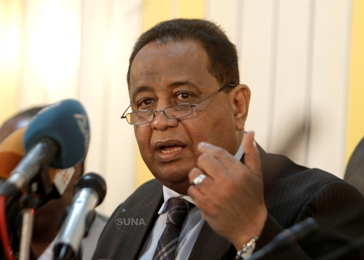Sudanese FM faces calls by lawmakers to support Qatar
June 7, 2017 (KHARTOUM) – Foreign Minister Ibrahim Gandour faced a wave of calls by the Sudanese legislators to declare Sudan’s support to Qatar which is facing huge diplomatic and economic pressures from Saudi Arabia, the United Arab Emirates and Bahrain to stop its alleged support to terrorist groups.

In a debate on Wednesday on the Gulf crisis at the National Assembly, Sudanese MPs called on the government to voice its support to Qatar saying the tiny Gulf state supported Sudan politically and economically when the country faced an international isolation.
“We will not stand neutral and we will not take sides but we are at the heart of the issue,” said Ibrahim Ghandour reassuring the MP that his government is actively working to ease the tensions and restore relations between the Gulf countries.
Ghandour further pointed to the “strong ties and blood ties linking the Gulf states”, expecting to overcome the crisis and reach an agreement satisfying the parties’ interests.
In a coordinated decision, Riyadh, Abu Dhabi and Manama cut diplomatic ties with Qatar, and closed land, sea and air links with Doha, saying the latter supports Iran, the arch foe of the Sunnite Gulf states, open its media including Jazeera TV for opponents criticising their regimes and supports terrorist groups.
Several Arab countries including Egypt, Yemen and Libya’s eastern-based government, Mauritania and even the Maldives severed diplomatic ties with Qatar, while other countries like Jordan Djibouti reduced their diplomatic status with Qatar while Senegal recalled its ambassador.
For his part, President of the Party of Liberation and National Justice, former head of the regional authority in Darfur Tijani al-Sissi, said that the Gulf crisis “put the country in an embarrassing position because the State of Qatar supported us in all respects”.
“I hope we do not slip into a situation that makes us regret it at least morally,” he further stressed and called on the government to send envoys to Doha, Riyadh and Manama in order to contain the situation.
Al-Sissi led a rebel coalition that signed the Doha Document for Peace in Darfur (DDPD) with the Sudanese government after nearly two years of negotiations in Qatar.
The former director of the National Intelligence and Security Services (NISS) and MP Salah Gosh attributed the crisis that broke out in the Gulf to the issue of terrorism and Hamas, the Palestinian Islamist movement that rules Gaza.
He pointed out that the Sudan does not consider Hamas a terrorist organisation, but a resistance movement. Also, he rejected the description of the Muslim Brotherhood as a terrorist group. He called for clear proposals that define Sudan’s position and what he called “red points”.
The head of the Just Peace Forum (JPF) party MP Tayeb Mustafa said that the value of fidelity requires that Sudan has to stand with Qatar, referring to the Qatari financial and political support for the country.
He explained that Sudan’s role and its participation in the Saudi-led military campaign against the Iran-backed Houthis in Yemen “are not sufficiently appreciated”.
For his part, leading member of the opposition Popular Congress Party Bashir Adam Rahma called to be grateful for the support provided by Qatar to the Sudan and to work for amending the relations between the Gulf states. He further condemned the economic embargo on Qatar saying it “is not acceptable to God or his Sharia”.
(ST)
